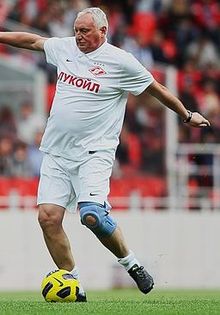Yuri Vasilyevich Gavrilov (Russian: Юрий Васильевич Гаврилов; born 3 May 1953 in Setun, Odintsovsky District, Moscow Oblast) is a Russian football manager and a former midfielder who played for Dynamo Moscow and Spartak Moscow.
 Yuri Gavrilov (2014) | |||
| Personal information | |||
|---|---|---|---|
| Full name | Yuri Vasilyevich Gavrilov | ||
| Date of birth | 3 May 1953 | ||
| Place of birth |
Setun, Odintsovsky District, Moscow Oblast, Soviet Union | ||
| Height | 1.85 m (6 ft 1 in) | ||
| Position(s) | Midfielder | ||
| Senior career* | |||
| Years | Team | Apps | (Gls) |
| 1972 | Iskra Moscow | ||
| 1973–1976 | Dynamo Moscow | 37 | (5) |
| 1977–1985 | Spartak Moscow | 280 | (89) |
| 1986 | Dnipro Dnipropetrovsk | 25 | (3) |
| 1987 | Lokomotiv Moscow | 35 | (12) |
| 1988–1989 | Porin Pallotoverit | 36 | (11) |
| 1990 | Lokomotiv Moscow | 16 | (0) |
| 1991–1992 | Asmaral Moscow | 60 | (8) |
| 1992 | Presnya Moscow | 10 | (4) |
| 1993 | Interros Moscow | 38 | (5) |
| 1994 | Saturn Ramenskoye | 41 | (13) |
| 1995–1996 | FC Agro Chişinău | 16 | (0) |
| 1996–1997 | Spumante Cricova | 4 | (0) |
| International career | |||
| 1978–1985 | Soviet Union | 46 | (10) |
| Managerial career | |||
| 1994 | FC Saturn Ramenskoye (assistant) | ||
| 1996 | FC Agro Chișinău (assistant) | ||
| 1996–1997 | Constructorul Chişinău (assistant) | ||
| 2000 | FC Chkalovets-Olimpik Novosibirsk | ||
| 2001 | DR Congo | ||
| 2002 | FC Mostransgaz Gazoprovod | ||
| 2003 | Torpedo-Metallurg Moscow (reserves assistant) | ||
| *Club domestic league appearances and goals | |||
| Olympic medal record | ||
|---|---|---|
| Representing | ||
| Men's Football | ||
| 1980 Moscow | Team Competition | |
He made 46 appearances for the Soviet Union national football team and scored 10 goals.[1] He also competed for the Soviet Union at the 1980 Summer Olympics and the 1982 FIFA World Cup in Spain.[2] His creative skills are immortalized by Konstantin Beskov's famous phrase "If you don't know what to do with the ball, pass it to Gavrilov". Yuri Gavrilov has his own football school in Moscow called SC Svyatogor.
Career
editGavrilov's football career started in Iskra Moscow football school when he was 7. He was invited by school director who saw Yury playing with other kids on the Iskra stadium. When he was 19, Konstantin Beskov took him to Dinamo Moscow from Iskra amateur team. But there was an expensive number of quality players in 1970s Dinamo, and Gavrilov couldn't find a permanent place in Dinamo squad.
Gavrilov followed Konstantin Beskov into Spartak Moscow in 1977. Gavrilov achieved the key playmaker role in new Spartak Moscow team built up by Beskov. After being winger in Dinamo, Gavrilov's new role in Spartak team let him show his best abilities and proved himself one of the all-time best Soviet football creative mid-fielders.
While he made a lot of good passes, he scored a lot of goals as well. Gavrilov was Soviet Top League top goal-scorer twice, scored 140 times during his career.
During his professional career Gavrilov played also for the Finnish club Porin Pallotoverit and Moldovan club FC Agro Chişinău.
In 2001 Gavrilov took charge of the DR Congo national football team for one game. He coached DR Congo in the 2002 FIFA World Cup qualification match against Ivory Coast.[3][4]
References
edit- ^ Arnhold, Matthias (27 March 2015). "Yuriy Vasilyevich Gavrilov - International Appearances". Rec.Sport.Soccer Statistics Foundation. Retrieved 8 April 2015.
- ^ "Yuri Gavrilov Biography and Statistics". Sports Reference. Archived from the original on 18 April 2020. Retrieved 29 October 2009.
- ^ "Russian takes over DR Congo". BBC Sport. 17 May 2001. Retrieved 26 October 2012.
- ^ "World Cup Archive". FIFA. Archived from the original on 16 November 2007. Retrieved 26 October 2012.
External links
edit- Yuri Gavrilov at National-Football-Teams.com
- Yuri Gavrilov at WorldFootball.net
- Yuri Gavrilov at FootballFacts.ru (in Russian)
- Yuri Gavrilov at Olympedia
- Yuri Gavrilov at Olympics.com
- Pictures of Yuri Gavrilov in Finland
- YouTube Channel of Yuri Gavrilov
- Pictures of Yuri Gavrilov (in Russian)
- Yury Gavrilov Foundation for the support and development of physical culture and sport (in Russian)